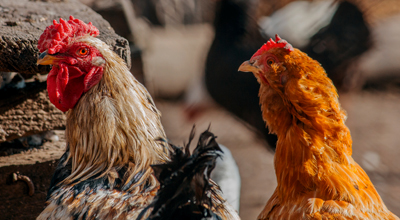
Image: Pixabay
Porto Alegre, November 30, 2020 - The Poultry Organization of the State of Rio Grande do Sul and its member entities, Asgav and Sipargs, evaluate the year 2020 as an atypical and challenging year due to extremely impactful situations, such as a pandemic, two droughts, disturbances in the grain market caused by very high prices and fluctuations in the domestic and foreign markets for poultry meat, eggs and derivatives.
According to the entities, the covid-19 pandemic redefined the sector's action plan and brought challenges, difficulties, redirection of investments and market changes. According to the executive president of Asgav, José Eduardo dos Santos, investments in adapting industries to adopt health and safety protocols reached approximately R$ 50 million in the first five months of the pandemic in the state. “The sector prioritized and paid maximum attention to preserving and protecting the health of its employees. The commitment and responsibility to maintain food production with easy access to the population, even in difficult times, were and are maintained”, he states.
Christmas Bird Market 2020
The production of Christmas birds in RS (including the production of turkey meat) to serve the local market, other states and exports is expected to be approximately 80 thousand tons per year. From turkeys alone, around 3.6 million heads will be produced this year, which generates a volume of approximately 35 thousand tons. “RS is the largest exporter of turkey meat in Brazil. Industry average prices for Christmas birds this year are expected to average R$ 9.95 per kilogram. Turkey meat should average R$ 17.00 per kilo. These prices registered an average increase of 16% compared to the previous year based on the high production cost and the difficulties that the sector is facing this year. The expected revenue will be approximately R$ 1.1 billion from the sale of these birds, around 22% higher than the previous year”, says Santos.
{module Form RD}
Broiler Chicken
The slaughter of broiler chickens in the poultry industry in RS in 2020 is expected to be around 825.4 million birds, registering a modest growth of 0.68% in relation to 2019. Poultry meat exports from RS are expected to close the year 2020 at around 671 thousand tons, 15% above the volume shipped in 2019, of 579 thousand tons. For 2020, with a gradual recovery from the losses recorded last year, export revenue could be around US$ 920 million, an estimated increase of 5 % compared to revenues obtained in 2019, of US$ 875 million. The total revenue of the Rio Grande do Sul poultry sector is estimated at R$ 16 billion/year. Chicken meat consumption in the state is estimated at 43 kilos per inhabitant per year, within the Brazilian average.
Egg Industry and Production
Rio Grande do Sul is the 5th largest egg producer in Brazil and the 1st exporter. The sector produces around 3.5 billion units of eggs per year and is expected to close 2020 with exports of around 2.6 thousand tons. Per capita consumption in RS is around 257 eggs per inhabitant/year, as determined in December 2018. RS also has two processed egg industries (pasteurized, liquid and powder).
Poultry farming in RS, prospects for 2021
The poultry sector in RS continues to expand in the state, new ventures have emerged and others are to come. Poultry farming in Rio Grande do Sul has been undertaking and investing in the State for decades. However, the fragility of corn production, which records an annual deficit of around 1.5 to 2 million tons per year, slows down the more dynamic development of the sector. The disturbance in the price of corn and soybeans, which is a consequence of several negative factors detected in 2020, such as two droughts, a pandemic and a reduction in grain supply, should change the sector's behavior in relation to the production platform in terms of costs. and commercial balance. Future purchases are expected to intensify, pressure for mechanisms to make grain imports more flexible will also be a permanent topic for the animal protein sectors.
Alternative winter crops such as wheat, triticale and sorghum for animal feed should receive special attention and will be the subject of discussion to make projects in the area viable. A project to resume actions to implement railways from the Center-West region to the South of the country was developed and should be presented to the federal and state governments to enable better grain supply logistics in the south of Brazil.
The RS poultry industry is the 3rd largest producer and 3rd largest exporter of chicken meat, is among the ten largest egg producers in Brazil and is the 1st exporter. The sector has considerable weight in the state and country's trade balance. Chicken meat is in second place in RS's general export list. With regard to health, investments and the adoption of biosecurity measures need to be given permanent attention to guarantee the maintenance of the health status of the Rio Grande do Sul and Brazilian poultry sector.
Finally, the commission structures and staff of the RS poultry organization and their respective entities will continue to work intensely on topics related to each area of the sector and following the activity plan, interacting with the equivalent chambers at ABPA, with the sole objective of providing support , progress in lawsuits, projects and search for solutions to the difficulties and challenges that fall within the productive sector. The information comes from the Poultry Organization of the State of Rio Grande do Sul.
Per Arno Baasch | CROP & MARKET












